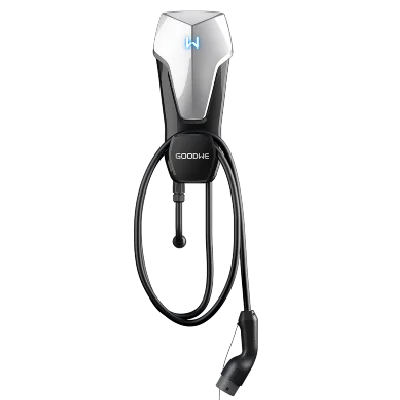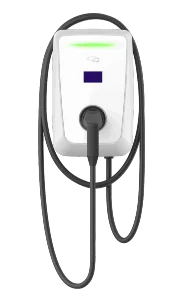



Sungrow EV AC Charger
The AC011E-01 11kW EV Charger is a high-performance and efficient charging solution for electric vehicles (EVs). AC011E-01 11kW EV Charger allows EV owners quickly top up their batteries, making it ideal for use at home, at work, or at public charging stations. The charger is also equipped with multiple safety features, including over-current protection, short-circuit protection, and overheating protection, ensuring safe and reliable operation.
The AC011E-01 11kW EV Charger is compact in size, making it easy to install, and a user-friendly display screen that provides real-time charging information and status updates. The charger is compatible with a wide range of EVs, including those from leading manufacturers such as Tesla, Nissan, BMW, and Chevrolet.


GoodWe
Goodwe HCA Series AC Charger is a series of electric vehicle (EV) chargers provide a convenient and fast charging solution for EV drivers. The HCA Series offers different power output options, ranging from 7 kW to 22 kW, to meet the varying needs of different EV models and charging speeds. It features an intuitive user interface, with a touch screen display that shows charging status, energy consumption, and fault diagnosis. Goodwe HCA Series AC Chargers are suitable for residential, commercial, and public charging applications, and can be easily installed and maintained.
Increasing Uptake of EV Chargers in Malaysia
Electric vehicles play a significant role in Malaysia’s shift towards a sustainable future. As of 2022, there are over 2,800 registered electric vehicles in the country, with approximately 70-80% of EV charging taking place at home, usually overnight.
Despite the common belief that electric vehicles are only accessible to the wealthy due to their higher cost, the price of EVs is continually declining with the introduction of more affordable models by household car brands. Brands such as BMW, Volkswagen, Kia, Nissan, and Hyundai, along with Tesla, all offer their own electric vehicles, and new models continue to be released each year.
EV Charger Installation Requirements And Advice
When installing an electric vehicle (EV) charger in Malaysia, it’s important to follow certain requirements and guidelines to ensure that the charger is installed safely and meets local electrical codes and regulations.
- Approvals and permits: Depending on your location and the type of charger you want to install, you may need to obtain approvals and permits from local authorities.
- Electrical capacity: Make sure your electrical system has enough capacity to handle the charger. This may require upgrading your electrical panel or service.
- Hiring a professional electrician: Hire a licensed and experienced electrician to install the EV charger. This will ensure that the charger is installed correctly and safely, and meets local electrical codes and regulations.
- Location of the charger: Choose a location for the charger that is easily accessible, near an electrical outlet, and away from any potential hazards.
Benefit of Installing EV Charger at Home
There are several benefits to installing an electric vehicle (EV) charger at home:
- Convenience: Charging your EV at home is convenient and saves time compared to finding a public charging station. You can simply plug in your vehicle overnight and have a full battery ready to go in the morning.
- Cost Savings: Charging at home is often cheaper than using public charging stations, especially if you have access to off-peak electricity rates.
- Increased Range Confidence: With an EV charger at home, you can be confident that you’ll have enough charge to get where you need to go, eliminating “range anxiety.”
- Improved Resale Value: Installing an EV charger at home can increase the resale value of your property.
- Reduced Carbon Footprint: By charging your EV at home, you’re reducing your dependence on fossil fuels and helping to reduce greenhouse gas emissions.
- Increased Energy Independence: By charging your EV at home, you’re reducing your dependence on the oil and gas industry, increasing your energy independence.

